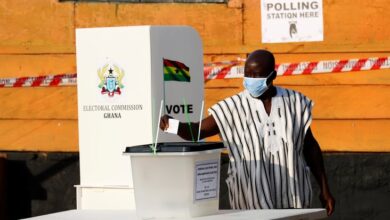The Troubling Trend of Misinformation from Nigeria’s Government Officials

BY: Mustapha Lawal & Oluwaseye Ogunsanya
1 year later, the Tinubu administration still struggles with effective public communication. Two conflicting press statements issued by the media spokespersons of the Nigerian President sparked confusion about the activities to mark President Bola Tinubu’s one year in office.
A rather unusual trend of misinformation has become a norm amongst press secretaries and media spokespersons of government officials in Nigeria. This trend involves the consistent mistake of sharing misleading information, deleting the shared information and then debunking the same piece of information as though it never originated from them.
This occurrence has been repeated multiple times within the span of the current administration’s one year in office, particularly on the issue of UAE visa services in Nigeria. Both Bayo Onanuga and Ajuri Ngelale, presidential spokespersons for President Bola Tinubu, have been involved in such incidents.
However, a new twist to this eyesore is the release of contradicting information from the media spokesperson of the Nigerian President. In a twist of events that unfolded in recent days, two conflicting press statements issued by the president’s spokespersons have been causing confusion about the activities to mark President Bola Tinubu’s one year in office.
The “Presidency” as represented in a statement signed by the Special Adviser to the President on Media and Publicity, Chief Ajuri Ngelale described an earlier statement signed by the Special Adviser to the President on Information and Strategy, Mr Bayo Onanuga corroborating the National Assembly clerk, Magaji Tambuwal’s statement that president Tinubu would deliver an address on the “state of the nation” at the joint sitting of the senate and house of representatives on May 29 as false and unauthorized.
Early on Tuesday, 28th May 2024, Magaji Tambuwal, clerk of the national assembly, said Tinubu would deliver an address on the “state of the nation” at the joint session of the National assembly. Tambuwal said the president will also inaugurate the National Assembly library.
Mr Bayo Onanuga also corroborated this in a statement released via his official X (formerly Twitter) account, said that President Tinubu would not make any broadcast on May 29 but rather would address the joint session of the National Assembly alongside other eminent Nigerians. He detailed that “the President’s speech will dwell on the achievements of his administration, Nigeria’s democracy since the military ceded power in 1999 and the commission of the National Assembly Library and Resource Center, now to be known as the Bola Ahmed Tinubu Building.”
However, in a twist, Ajuri Ngelale issued another statement reacting to public commentary and describing Onanuga’s information as false and unauthorized. Ngelale clarified that the Office of the President was not involved in the planning of the event and that the information about the President’s speech was incorrect.
House Goofed: Tajudeen Abass Takes Responsibility
The Speaker of the House of Representatives, Abbas Tajudeen, would later clarify that President Tinubu declined to address the joint session of the National Assembly because all activities to mark Democracy Day will be held on 12 June.
Mr Tajudeen added that it was the House that goofed in inviting the president to address a joint session, stating that the lawmakers have been “corrected by the president” and he will only flag off the Old National Anthem which has come into effect with the signing of the controversial National Anthem Bill.
Tinubu Administration Still Struggling With Effective Public Communication
This incident is just one example of the confusing and contradictory messages coming from Nigeria’s government officials. Such misinformation creates public confusion, undermines trust in government communications, and complicates the public’s understanding of important national events.
This development has gone to confirm the notion that the president’s media team lacks coordination in handling his administration’s communication of policies and programmes thereby making them purveyors of misinformation.
According to ICIR analysis, since Tinubu became the president on May 29, 2023, his media team has made various misleading claims, thus sparking public outrage and undermining the administration’s credibility. The analysis especially singled out Tinubu’s Special Adviser on Media and Publicity, Ajuri Ngelale and his Special Adviser on Information and Strategy, Bayo Onanuga as the leading figures in spreading misinformation through misleading press releases.
Relatively, a CDD article stated that the Nigerian government, under Bola Tinubu, has seen information disorder take centre stage. It added that personnel announcements, policy rollout, and presidential positions have been affected in an era where governments are faced with the challenge of increased access to information – and misinformation.
“In the aftermath of keenly contested elections that were impacted by information disorder, the government must have been aware of the possibility for information to be mistakenly and intentionally weaponized to produce devastating effects. Already, the government has had to deal with misconceptions around the federal government’s palliative measures to states and the president’s visit to Qatar for a Business and Investment Forum. The first event led to governors seeking to correct the misconception, while the second brewed diplomatic tension until the earlier approved memo was renounced.” The article reads part.
As recommended in the article, president Tinubu must act fast and take charge by streamlining the government’s communications team and by also clearly defining the roles of every individual as to who has the final say on any public statement or announcement. Doing this will go a long way in saving his administration from monumental shame and disgrace.
FactCheckAfrica believes the repetition of such incidents involving key supposed authoritative figures within the administration underscores the need for a robust and reliable communication strategy. It not only brings into question the coordination within the government’s information channels but also highlights the potential consequences of misinformation on public sentiment and trust. It highlights the need for better coordination and accuracy in the dissemination of official information to the public.
As the digital age intensifies the impact of such incidents, there is a pressing need for transparency, accountability, and a proactive approach to avoid the recurrence of misinformation that can have far-reaching implications. The role of public officeholders in ensuring accurate and timely information cannot be overstated, and lessons must be learned from these episodes to prevent history from repeating itself.




